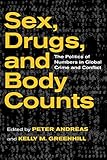Sex, Drugs, and Body Counts : The Politics of Numbers in Global Crime and Conflict / ed. by Peter Andreas, Kelly M. Greenhill.
Material type: TextPublisher: Ithaca, NY : Cornell University Press, [2011]Copyright date: ©2011Description: 1 online resource (304 p.) : 7 charts/graphs, 10 tablesContent type:
TextPublisher: Ithaca, NY : Cornell University Press, [2011]Copyright date: ©2011Description: 1 online resource (304 p.) : 7 charts/graphs, 10 tablesContent type: - 9780801476181
- 9780801458309
- International relations -- Statistics -- Political aspects -- Case studies
- Policy sciences -- Statistical methods -- Case studies
- Statistics -- Political aspects -- Case studies
- Transnational crime -- Statistics -- Political aspects -- Case studies
- International Studies
- Political Science & Political History
- Sociology & Social Science
- SOCIAL SCIENCE / Statistics
- 363.32072/7 22
- HA29
- online - DeGruyter
- Issued also in print.
| Item type | Current library | Call number | URL | Status | Notes | Barcode | |
|---|---|---|---|---|---|---|---|
 eBook
eBook
|
Biblioteca "Angelicum" Pont. Univ. S.Tommaso d'Aquino Nuvola online | online - DeGruyter (Browse shelf(Opens below)) | Online access | Not for loan (Accesso limitato) | Accesso per gli utenti autorizzati / Access for authorized users | (dgr)9780801458309 |
Frontmatter -- Contents -- Contributors -- Acknowledgments -- 1.Introduction: the politics of numbers -- 2.The Politics of Measuring Illicit Flows and Policy Effectiveness -- 3.Trafficking in Numbers: the social construction of human trafficking data -- 4. Numbers and Certification: assessing foreign compliance in combating narcotics and human trafficking -- 5. The Illusiveness of Counting "Victims" and the Concreteness of Ranking Countries: trafficking in persons from Colombia to Japan -- 6. Counting the Cost: the politics of numbers in armed conflict -- 7. Research and Repercussions of Death Tolls: the case of the Bosnian book of the dead -- 8. The Ambiguous Genocide: the U.S. state department and the death toll in Darfur -- 9. Accounting for Absence: the Colombian paramilitaries in U.S. policy debates -- 10. (Mis)Measuring Success in Countering the Financing of Terrorism -- 11. Conclusion: the numbers in politics -- Index
restricted access online access with authorization star
http://purl.org/coar/access_right/c_16ec
Big, attention-grabbing numbers are frequently used in policy debates and media reporting: "At least 200,000-250,000 people died in the war in Bosnia." "There are three million child soldiers in Africa." "More than 650,000 civilians have been killed as a result of the U.S. occupation of Iraq." "Between 600,000 and 800,000 women are trafficked across borders every year." "Money laundering represents as much as 10 percent of global GDP." "Internet child porn is a $20 billion-a-year industry."Peter Andreas and Kelly M. Greenhill see only one problem: these numbers are probably false. Their continued use and abuse reflect a much larger and troubling pattern: policymakers and the media naively or deliberately accept highly politicized and questionable statistical claims about activities that are extremely difficult to measure. As a result, we too often become trapped by these mythical numbers, with perverse and counterproductive consequences.This problem exists in myriad policy realms. But it is particularly pronounced in statistics related to the politically charged realms of global crime and conflict-numbers of people killed in massacres and during genocides, the size of refugee flows, the magnitude of the illicit global trade in drugs and human beings, and so on. In Sex, Drugs, and Body Counts, political scientists, anthropologists, sociologists, and policy analysts critically examine the murky origins of some of these statistics and trace their remarkable proliferation. They also assess the standard metrics used to evaluate policy effectiveness in combating problems such as terrorist financing, sex trafficking, and the drug trade.Contributors: Peter Andreas, Brown University; Thomas J. Biersteker, Graduate Institute of International and Development Studies-Geneva; Sue E. Eckert, Brown University; David A. Feingold, Ophidian Research Institute and UNESCO; H. Richard Friman, Marquette University; Kelly M. Greenhill, Tufts University and Harvard University; John Hagan, Northwestern University; Lara J. Nettelfield, Institut Barcelona D'Estudis Internacionals and Simon Fraser University; Wenona Rymond-Richmond, University of Massachusetts Amherst; Winifred Tate, Colby College; Kay B. Warren, Brown University
Issued also in print.
Mode of access: Internet via World Wide Web.
In English.
Description based on online resource; title from PDF title page (publisher's Web site, viewed 29. Mrz 2022)


